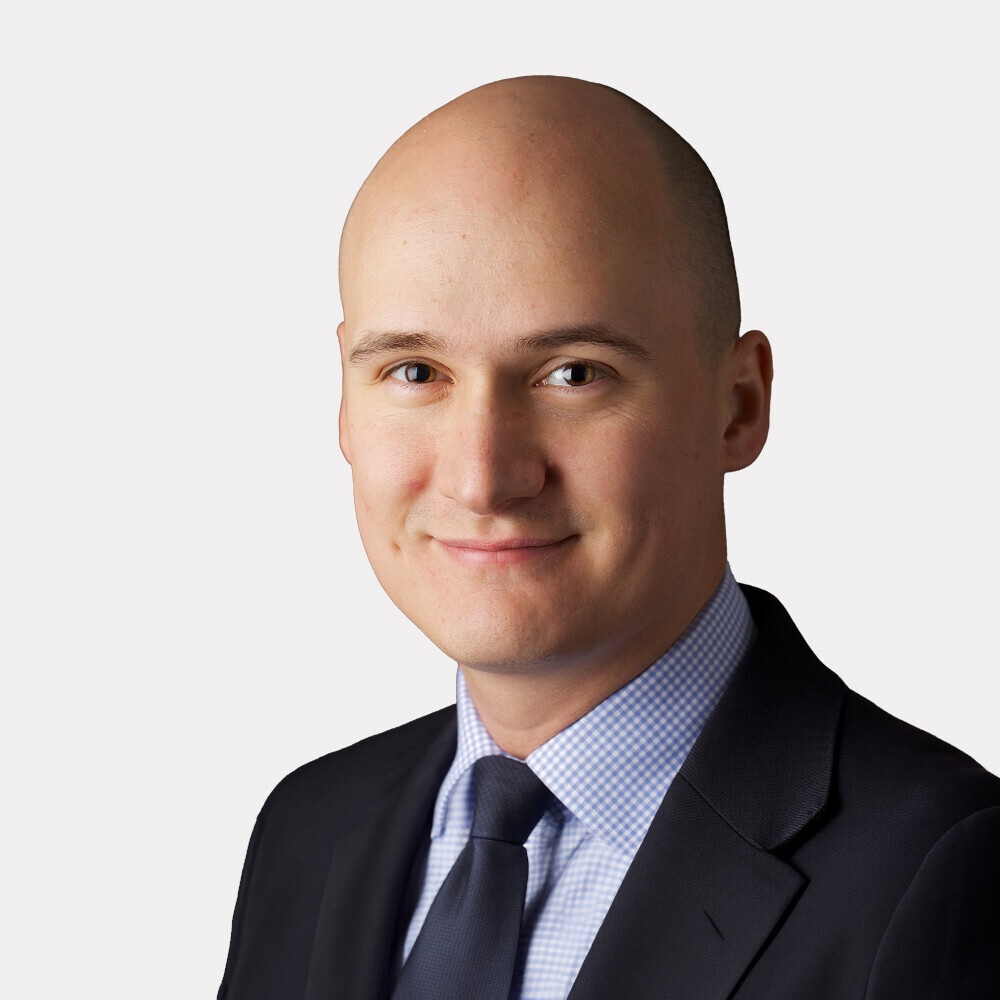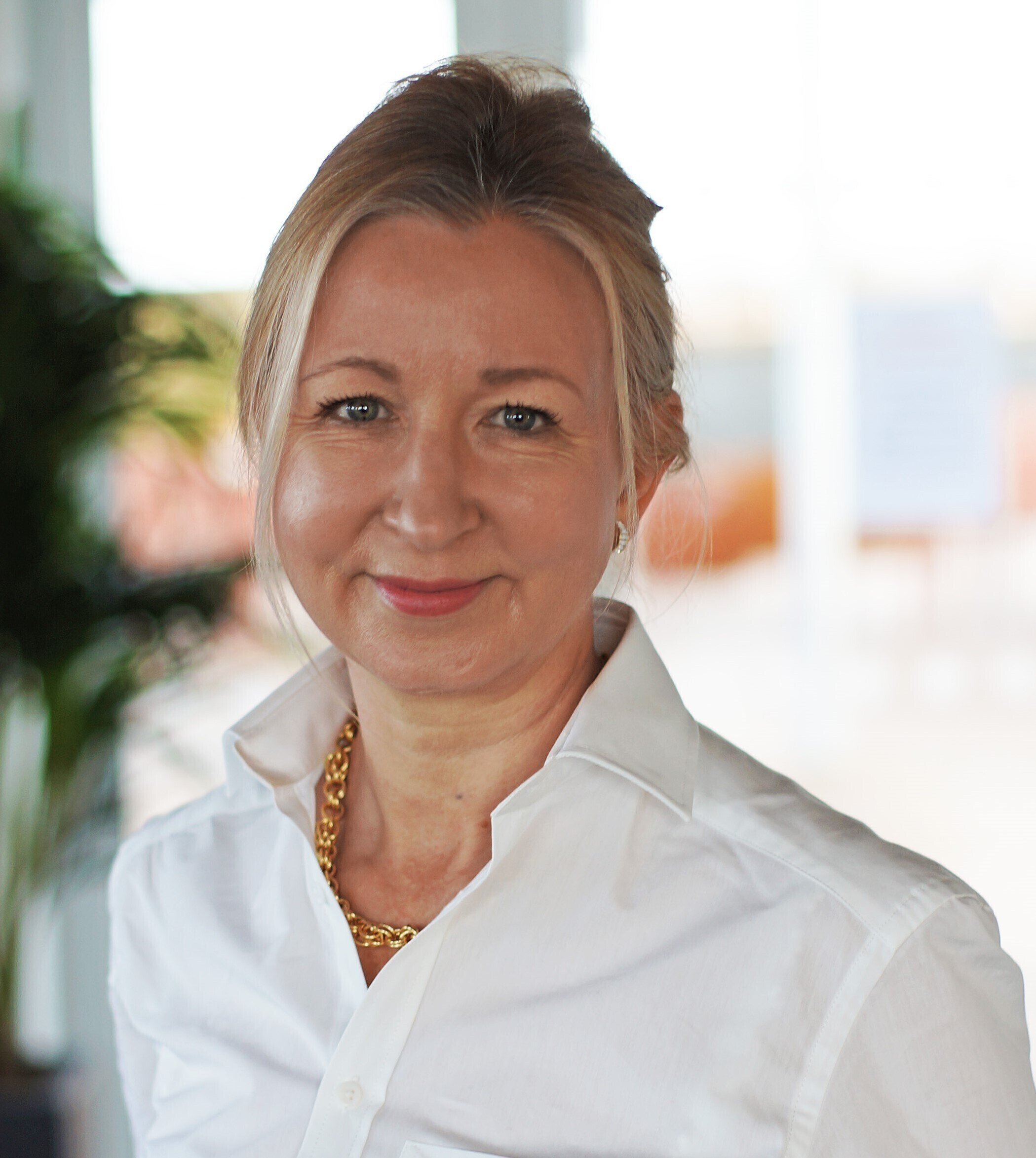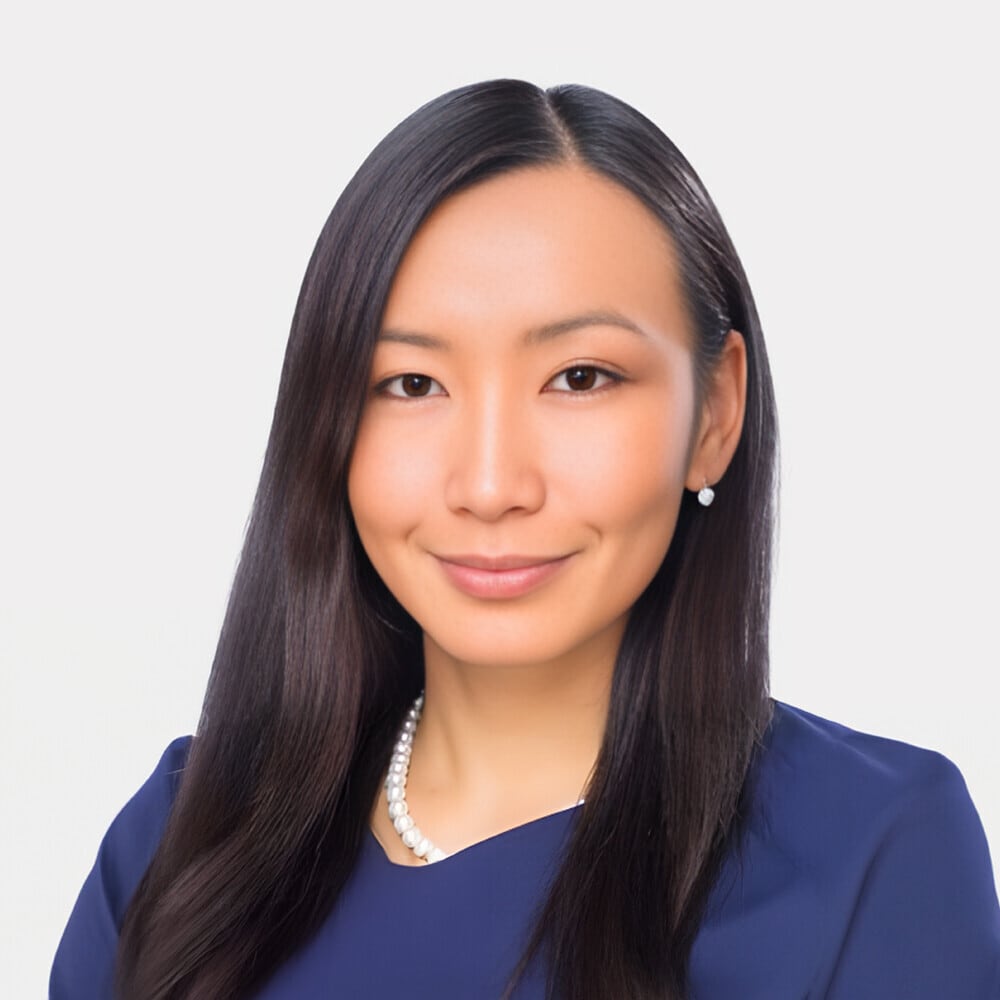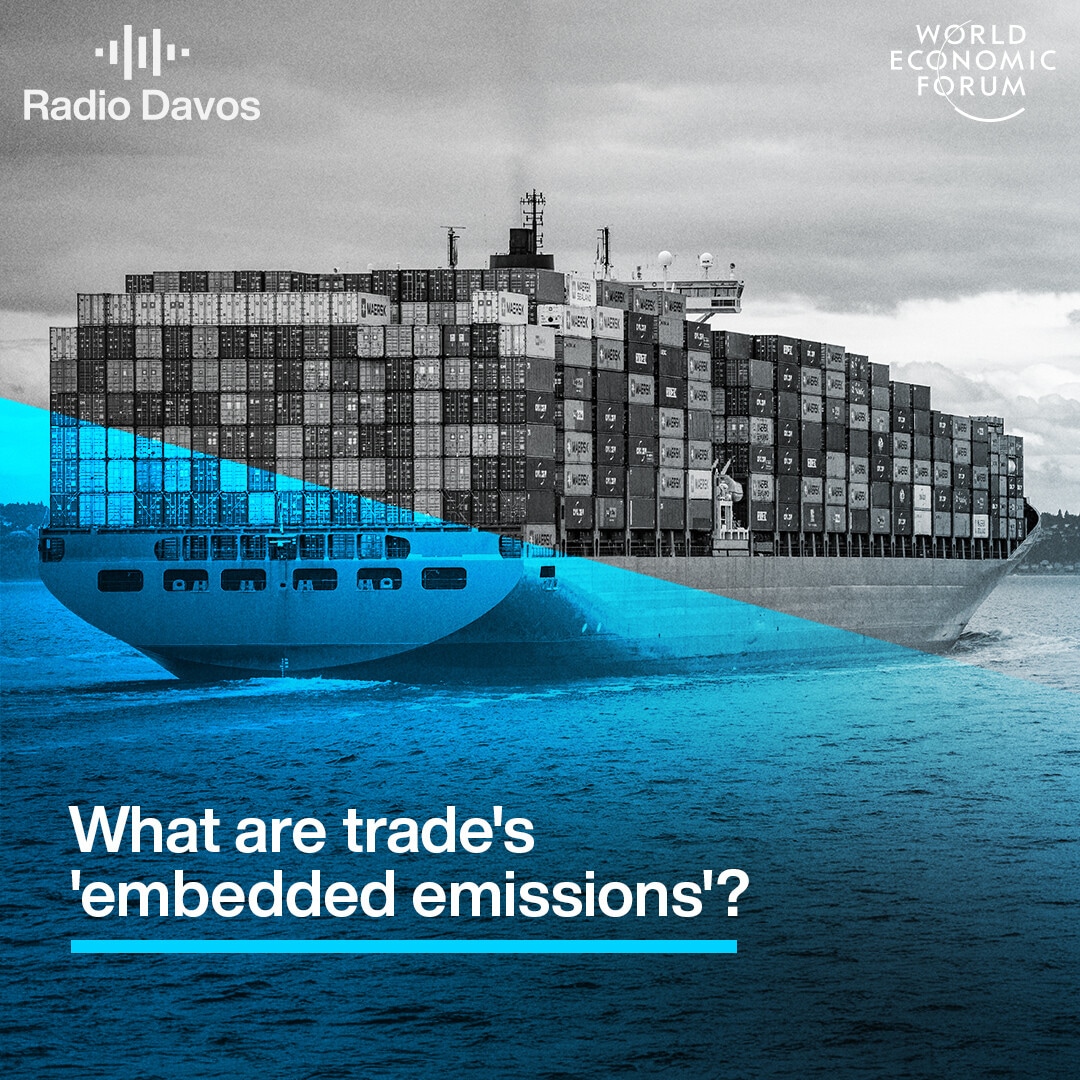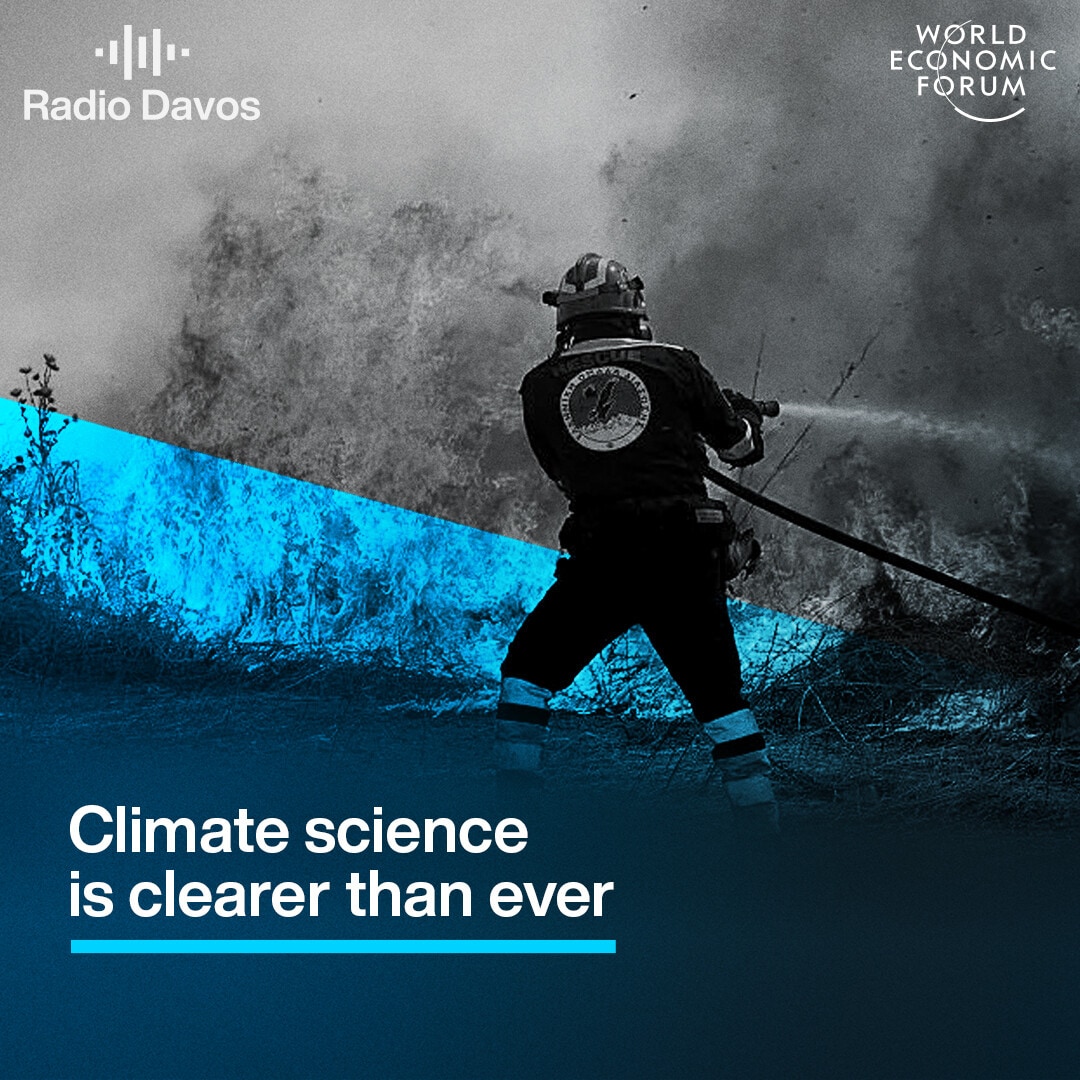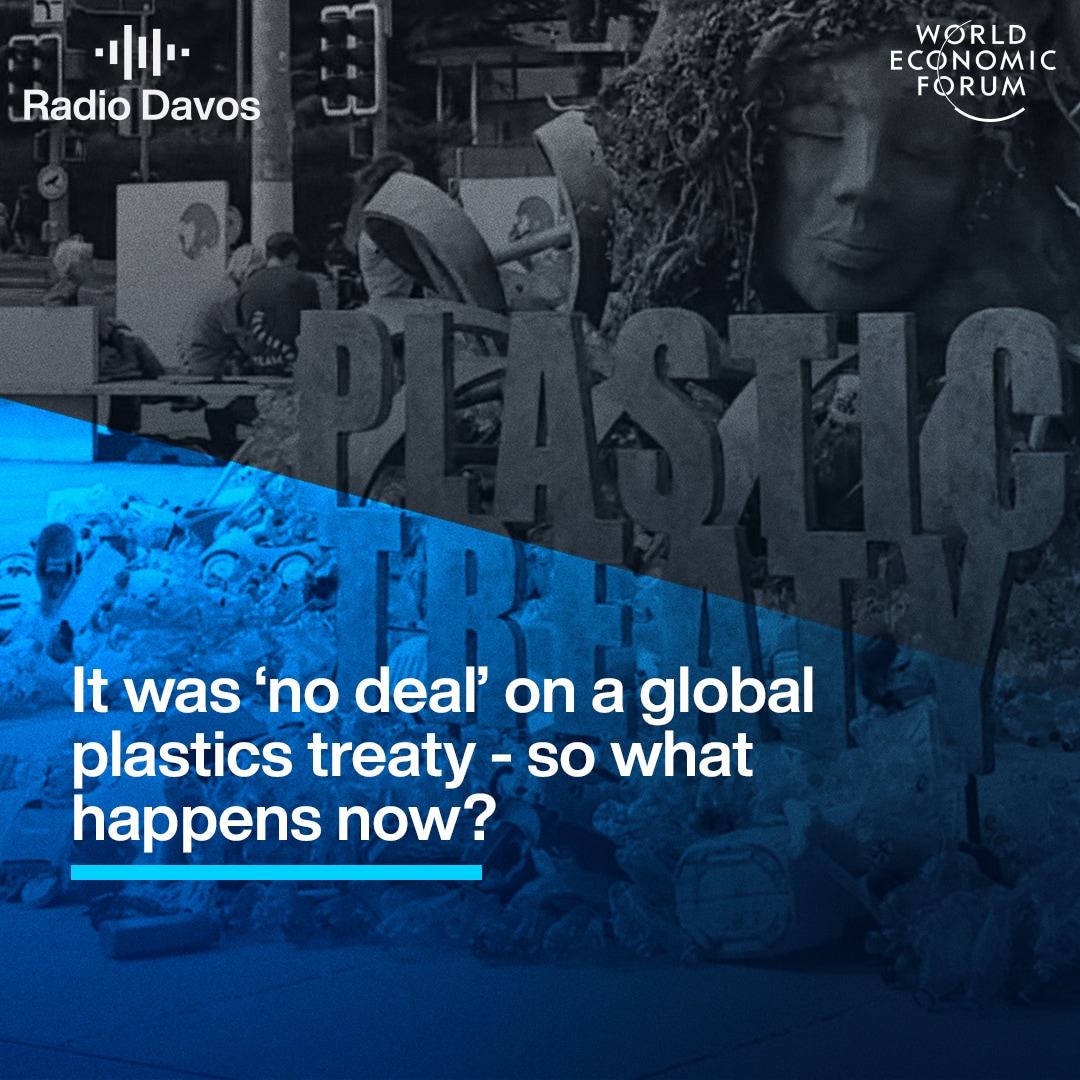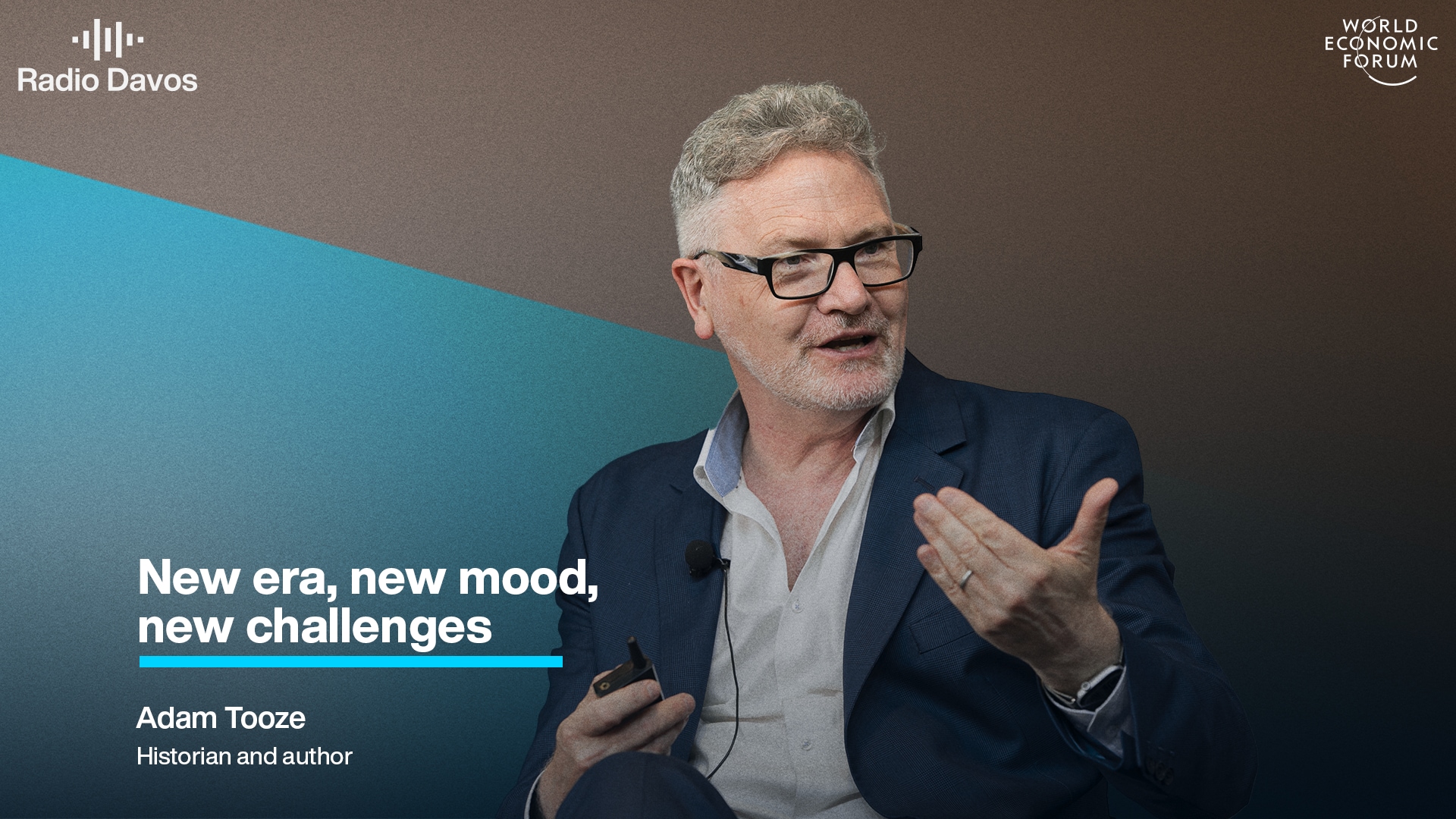Halfway through 2025, reasons to be optimistic in a turbulent year
Scroll down for full podcast transcript - click the ‘Show more’ arrow
As we enter the second half of a turbulent 2025, we hear key lessons from the Summer Davos, AMNC25, and leaders from the World Economic Forum set out their priorities for the rest of the year where global collaboration is needed more than ever.
Catch up on all the action from AMNC25 at wef.ch/amnc25 and across social media using the hashtag #AMNC25.
Listen to selected AMNC sessions on the Agenda Dialogues podcast.
Forum reports mentioned in the podcast:
Forum initiatives mentioned in the podcast:
Related podcasts:
Guests:
播客文字稿
This transcript has been generated using speech recognition software and may contain errors. Please check its accuracy against the audio.
Sheba Crocker, head of Global Communications Group, World Economic Forum: Despite this geopolitical and geoeconomic uncertainty, we still see a real hunger and a feeling of need to continue to find places where we have some common interests and where we can therefore still find ways to coordinate and collaborate.
Robin Pomeroy, host, Radio Davos: Welcome to Radio Davos, the podcast from the World Economic Forum that looks at the biggest challenges and how we might solve them. This week, as we enter the second half of 2025, we try to make sense of a tumultuous year.
Saadia Zahidi, head of Centre for New Economy and Society, World Economic Forum: Some of this change, some of this transformation, potentially even described as upheaval, also opens the door for things to be done differently.
Robin Pomeroy: The World Economic Forum just held its Summer Davos in China, and I asked Forum leaders what lessons we learned there, what might give us reasons for optimism, and what we should be watching out for now.
Sebastian Buckup, head of Centre for Nature and Climate, World Economic Forum: One important point of optimism for me was a very strong can-do spirit around decarbonisation and pollution which is rooted here in China in real progress.
Mirek Dusek, responsible for the World Economic Forum summits: I've seen a lot of solutions-oriented people, innovators, technologists who are really unstoppable in terms of how they think about the future.
Kiva Allgood, head of Centre for Advanced Manufacturing and Supply Chains, World Economic Forum: Everyone is still leaning into openness. Everyone still firmly believes that the path forward for prosperity and for growth and for innovation is through collaboration.
Gim Huay Neo, head of Asia strategy, World Economic Forum: The next generation of leaders bring with them dynamism, vibrancy. Within Asia, we have 1.1 billion of them between the ages of 15 to 29.
Robin Pomeroy: I’m Robin Pomeroy at the World Economic Forum, and with this look at what happened at the Summer Davos, and why there are reasons to be hopeful for the rest of 2025…
Jeremy Jurgens, head of innovation and emerging technology, World Economic Forum: There's so much optimism. We just have to have eyes open to look for it.
Robin Pomeroy: This is Radio Davos.
I have just returned from China, where the World Economic Forum was holding the Annual Meeting of the New Champions, AMNC, also known as the Summer Davos. And just as the winter Davos, in January, sets the global outlook for the world that year, AMNC gives us a chance to assess the year so far and consider what to expect in the rest of the year.
My colleagues and I did loads of great interviews with some of the business leaders, academics and policy experts at the event, in Tianjin, and we’ll be bringing you those in the coming weeks.
But I also got to speak to leaders from inside the Forum - the managing directors who lead the Forum’s work, not just at these big events, but throughout the year, convening smaller groups of people and publishing vital research on many of the biggest topics.
There were seven Forum managing directors in Tianjin and I asked them all the same three questions: where do you find optimism in the world as it is today; what was your highlight from the Summer Davos; and what is your focus for the rest of the year.
We’ll hear their replies and also listen in on some of the discussions that you can catch up on on our website, weforum.org, and on our sister podcast Agenda Dialogues where we will be posting the audio from the best sessions from AMNC.
Let’s start with one of those, addressing one of the biggest issues of 2025 - global trade. Here is Eswar Prasad a Professor of economics at Cornell University, New York, talking to Chinese journalist Tian Wei.
Tian Wei, Host, World Insight with Tian Wei, China Global Television Network (CGTN): Despite of the narrative, we also see tremendous economic interdependence between China and the United States while, at the same time, there is leverage on both sides toward one another as well. Exactly how accurate is that narrative of antagonism, of rivalry only?
Eswar Prasad, Professor, Cornell University: These are the two largest economies in the world and they cannot sidestep each other. The question is whether they step on each other's toes or end up dancing with each other. And the latter prospect seems unlikely right now.
But what we are learning from the outcomes of the negotiations we've seen between the two sides so far, it's not that either side possesses all the cards. Both sides can potentially inflict pain on each other.
I think we would all like to be in a world where the two sides are collaborating and cooperating with each other, trying to think about what the choke points are.
But the reality we face right now is that there is one critical element that is going to be very difficult to reconcile between the two countries.
Trump has talked about reviving smokestack manufacturing in the U.S., but really what we've seen from the Biden administration and so on is that the U S. wants a manufacturing revival in the new technology industries, electric vehicles, green energy and so on. Now the problem is that these are precisely the industries that China is counting on for its technological upgrading and moving up the value added chain.
And unfortunately, when you think about these new technologies, all the benefits of cooperation are falling prey to the fact that both countries now see this as a zero or even negative sum game.
And what we've seen in the progress of the negotiations is that there has been a whiplash in terms of which party seems to have the upper hand. Towards the beginning of the year, it looked like the US economy was in strong shape. China was floundering somewhat, and therefore the US had a stronger hand. That narrative has shifted. It is clear right now that the Chinese economy does seem to be doing quite well, not just in terms of exports, but even in terms domestic demand. So that narrative has shifted.
So the question is, how can we come to an agreement where the two sides can, in a sense, declare victory without bending the knee to each other. It's going to be a very difficult process, but I think it's very good that we have discussions at the technical, policy, and leadership levels. That gives me hope.
Robin Pomeroy: Eswar Prasad, Economics Professor, speaking at AMNC25 on a session called China's Economy: Analysed.
Talking of economics, I spoke to the head of the Forum’s Centre for New Economy and Society, Saadia Zahidi. Before Saadia, this is a fellow Forum managing director, the person in charge of putting on big meetings like Davos and AMNC…
Mirek Dusek: I am Mirek Duszek, I am responsible for the World Economic Forum's summits and I'm also responsible for how we work with business leaders from around the world.
Robin Pomeroy: Hi Mirek, we're halfway through 2025. It's been a bumpy, turbulent six months so far. Do you have reasons for optimism? What gives you hope?
Mirek Dusek: Well, we are here in Tianjin at the Annual Meeting of the New Champions. I have to say that, yes, we discuss here a lot the geoeconomic and the geopolitical challenges that the world is facing. But what gives me optimism is that I've seen a lot of solutions-oriented people. We have a big cohort of innovators, technologists who are really unstoppable in terms of how they think about the future.
But I have to say the solutions- oriented mindset has been permeating throughout the meeting across these different communities that we gather here.
Robin Pomeroy: Has there been one particular highlight for you from Tianjin?
Mirek Dusek: I think it was the very focused discussion that we had between the Chinese business community and the Middle East business community, because to me this is a testament of how economic investment relations are changing, the changing geography of the world's economy, if you will. But this was the meat on the bone, seeing how particularly this relationship is going from strength to strength. And again, a lot of people are quite innovative around how to turbo charge this.
Robin Pomeroy: And so for the rest of the year, and then with a view to the Annual Meeting in Davos, January 2026, what are you looking out for?
Mirek Dusek: We're already hard at work planning the Annual Meeting in Davos.
I think what is quite exciting is how businesses are implementing AI in industry and so we will be preparing of course the agenda on the issue of AI with a lot of our partner companies from around the world and others and I'm quite curious because the velocity of change is just tremendous. So when is the next ChatGPT, DeepSeek moment? Will we have it before Davos, at Davos?
Just to say that this is going to be front and centre of the agenda at the Annual Meeting in January. And we are hard at work and very much in touch with all the innovators, businesses and governments that are relevant for this discussion.
Saadia Zahidi: I'm Saadia Zahidi, Managing Director at the World Economic Forum.
Robin Pomeroy: Saadia, we're halfway through a turbulent year, are there some points of optimism that should give us?
Saadia Zahidi: I think we've seen that there has been, despite that geo-economic turbulence, there has been conversation, dialogue, even agreements, bilateral agreements between countries in the global South, groups of countries that are choosing to think differently than the way the polarisation in the world is headed.
There has cross-border investment, again, between developing and emerging markets. There's also conversation and dialogue that has opened up between countries that we haven't seen in a very long time.
So, while there is, of course, fragmentation, I think we should also look at this as an opportunity. Some of this change, some of this transformation, potentially even described as upheaval, also opens the door for things to be done differently.
Robin Pomeroy: We're talking here in Tianjin, China, at the AMNC25. Has there been a particular highlight for you?
Saadia Zahidi: I think it's been really interesting to see how an economy here in China that contributes to 30% of global growth in 2025, how they're thinking about where to invest. And as they're designing the next five-year plan here in China, which are going to be the sectors to invest in, what might that mean for people's jobs? What might that means for the domestic economy? But also, what might mean for the rest of the world?
So there is a lot that will happen here in China, but also more broadly in Asia, that will impact growth for the rest of world for many years to come.
Robin Pomeroy: What should we be looking at for in the rest of the year and then in the build up to the next Annual Meeting in Davos to 2026 in January?
Saadia Zahidi: So I think there's two things really.
One is, of course, what happens in terms of the economic outlook. And just a month ago we produced at nearly that mid-year point our latest Chief Economists Outlook. And it was the first time in the years that we've been doing this that 100% of the chief economists that we surveyed were concerned about the year ahead. And they were all pessimistic about the economic outlook for the year ahead.
So I think watching where that moves in the next six months, if instead we start seeing again some of the growth, if we start seeing the results of some of conversations that are happening between countries, that, I think, is one area to watch.
And then the second thing is artificial intelligence. So, the chief economists that we speak to did not expect artificial intelligence to be commercially disruptive within the next year. However, many are thinking about the opportunities it creates in the longer term and some are even predicting, about 32% of them are predicting, that we could see an impact on global GDP in the next 10 years of 5 to 10%. Now that is much much much higher than the sort of tepid growth numbers that we're currently seeing of around 2.8% at the moment.
So there's a lot to watch when it comes to artificial intelligence impacting the economy but also the opportunities that that creates for people's jobs.
On the one hand, there is a risk to be watched as to whether companies start using artificial intelligence only to do more efficiently what they currently do. Or do they imagine a new set of value add? Do they figure out how to use artificial intelligence to augment workers and actually unleash their creativity and innovation? That's, I think, the second big area to watch.
Robin Pomeroy: Saadia Zahidi, head of the Forum’s Centre for New Economy and Society, and, before her, Mirek Dusek.
Let’s hear from another big thinker speaking at AMNC, here’s historian Adam Tooze, speaking on a session called Entrepreneurship for a New Era.
Adam Tooze, Director, European Institute, Columbia University: The sources of innovation are so much more radically diverse than they were before.
I mean, to put it crudely, for most of the history of technology, it was people that looked and sounded like me that drove the process, white men in Europe and the United States. It's a sad, but I think inescapable fact. And it's an incredibly limited group of the human species and the human collective mind.
And the extraordinary situation we currently face is that we are close to the point with half of every global cohort of young people enters education. Across the entire planet, half of all young people, and if that doesn't make you optimistic, I just genuinely don't know what would, because that really means that we are opening up sources of innovation which are exclusively larger, and of course all of those minds combined with each other in networks which are vastly greater.
Robin Pomeroy: Adam Tooze - and look out for our interview with him on Radio Davos, a video-podcast recorded at AMNC, and due to be published next week.
A highlight of the Summer Davos is the address by the host government. Chinese Premier Li Qiang spoke at the opening plenary. Let’s hear a clip from him in the English translation
Premier Li Qiang: I believe changes and transformation are often accompanied by restructuring and reshaping. The world economy of tomorrow will not be a simple repetition of stories of the past. That said, no one can alter the overriding trend of history or the law of the objective world.
Economic globalisation will not be reversed. It will only carve out a new path, forge ahead amid twists and turns, and achieve an upward spiral.
Robin Pomeroy: Chinese Premier Li Qiang speaking at the AMNC25 opening plenary - you can watch that on our website, or listen on the Agenda Dialogues podcast episode called Opening Plenary with Chinese Premier Li Qiang.
The managing director in charge of the Forum’s work in China and in Asia more widely is Gim Huay Neo.
Gim Huay Neo: Hi, my name is Gim Huay Neo, Managing Director at the World Economic Forum, overseeing our Asia strategy.
Robin Pomeroy: We're halfway through as we end the AMNC25, we're also halfway through the year, maybe a turbulent year. Are there points of optimism that should give us some hope?
Gim Huay Neo: Certainly I feel optimistic. There are three key reasons why.
This meeting gathered 1,700 leaders from very diverse backgrounds across 90 geographies. There is still a very strong appetite for people to connect with each other to address global issues and to partner in a way that can bring about more prosperity, more growth. And build a better future. That gives me hope.
The second area where I feel very hopeful is also the potential of technology. We can harness it. If we harness it well, we can actually really scale and accelerate solutions to address many of these global challenges. And as you know, the environmental crisis is very close to my heart, and I feel that technology will actually be able to be a key enabler to address many of these issues that we face in the environmental space.
The final reason for hope, and wearing my hat as head of Asia strategy, is really that there is also the next generation of leaders that are very aware of the challenges of our time and they're eager. They bring with them dynamism, vibrancy. Within Asia, we have 1.1 billion of them. Between the ages of 15 to 29, and without taking away responsibility from my generation, I do feel that with more intergenerational collaboration, we will be able to turbocharge to build a new and better era for next generations.
Robin Pomeroy: This was your first AMNC, Summer Davos, the event that takes place in China, as head of Asia for the World Economic Forum. Was there a particular highlight for you?
Gim Huay Neo: There were many, many highlights in this meeting. Many of the bilateral meetings were very fruitful and meaningful for me to build connections to the ecosystem here, various stakeholders.
I would say that one of the highlights of this annual meeting was the opening plenary by Premier Li Qiang. He's been a keen supporter of the Annual Meeting And in his speech, which I found very powerful, he actually spoke very openly about the need for entrepreneurship, on the need of all of us to harness the spirit of entrepreneurs, to think about how we can harness technology, harness the power of the collective of partnerships, to transform societies and economies. Even as we look at the current issues, we can potentially think much further ahead and leapfrog.
His dialogue with the global CEOs was also very direct and reiterating China's openness and commitment to global collaboration and looking for win-win partnerships, whether this is in trade, in the economy, in society, or in cultural exchanges.
Robin Pomeroy: And what's the one thing you'll be looking out for between now and the rest of the year and the next Annual Meeting in Davos?
Gim Huay Neo: Well, it's not that far away, we're just six months away from January 2026. I think the world will potentially still continue to bring surprises and possible shocks.
We need to continue to look at how we can build bridges and obviously my priority will be over the next few months to really get to know China, our key stakeholders in this ecosystem and look at how we can continue to engage with them and bring relevance to their concerns and look for opportunities where we can bring China, Asia to the world and also the world to China and Asia.
Jeremy Jurgens: Hi, my name is Jeremy Jurgens, Managing Director at the World Economic Forum, and I look after our innovation and emerging technology activities.
Robin Pomeroy: Are there things of optimism that should be giving us hope?
Jeremy Jurgens: Actually, the great thing to be here in Tianjin this year is there's so much optimism. We just have to have the eyes open to look for it.
We had over 1,700 participants here. They came together discussing positive, constructive solutions, how to address many of the shared challenges we face around the globe. And I was actually really energised just by the enthusiasm, the willingness.
We hosted a group of 100 Technology Pioneers, as we call them, this morning. New class that we introduced this year, and I asked them, okay, what's your main takeaway here? And they told me, it's actually the connections we've made, to actually realise there's so many other people out there looking to address these challenges, and actually sharing that positivity.
I don't want to under-recognise a level of challenges that are there externally, but I think it's important that there are people actively working on these challenges and doing so with enthusiasm and optimism.
Robin Pomeroy: Is there a particular highlight for you from this week in Tianjin?
Jeremy Jurgens: We launched our 10 Emerging Technologies report. And the highlight for me was actually not only having done the academic research to pull these technologies together and understand what's happening, but actually to be able to meet some of the innovators. They were coming there. One that particularly highlighted for me was a company out of France, a new startup, and they're actually using osmosis to take the energy difference between saltwater and freshwater. And this can occur at the ends of rivers, estuaries and so on, and actually generate clean electric power from that. And they're building a station near Marseille, hope to be able to visit that in the future.
But these are the kind of examples that you don't necessarily hear about was in our Top 10 Emerging Technologies. And then really great to actually have, you know, exemplary companies driving these technologies with us here in Tianjin.
Robin Pomeroy: I met him as well, it should be on a future episode of Radio Davos, and we reported on the top ten, that all of the top 10 are in an existing episode of Radio Davos which people should look out for. Finally, what should we be looking out for, what are you looking out for, between now and the end of the year and moving then on to the annual meeting in Davos?
Jeremy Jurgens: Where I'm looking is actually beyond AI. You know, there's a lot of focus on AI. NVIDIA hit a new record market cap this week, I think $3.7 trillion. And so while there's so much media attention on AI, there's actually a number of new technologies that are emerging that AI is enabling, helping us unlock further.
And so just as quickly as AI is moving, we're seeing also similar movement in so many of these other areas. That's something I'll be paying close attention to, whether that's in quantum computing, in new energy technologies, in the biotech sector, number of these different areas.
So I expect that we'll see similar rapid progress. It may not be as reported as widely, but this will, I think, be something we can monitor in the coming six months.
Robin Pomeroy: Forum Managing Director Jeremy Jurgens mentioned the Top 10 Emerging Technologies report, you can hear that Radio Davos that explains each of those top techs wherever you are listening to this podcast, and find the video-podcast version on the Forum’s YouTube channel.
Talking of tech and AI, here’s a clip from a session at AMNC called Understanding China's Approach to AI.
Kian Katanforoosh, Founder and Chief Executive Officer, Workera: Half-life of skill is going down, meaning you need to refresh your skills all the time. Learning velocity is becoming the competitive advantage for organisations. I think as a result, they have to become skills-based organisations.
We're going to start seeing the first set of skills-based organisation, which are really good at measuring skills internally. That's called skills intelligence.
Once you're really good at measuring skills. You can operate with data rather than operating with vibes or who you know or I managed this person last year and I think they did well and I'm going to give them the best projects I have. And that's going to turn organisations into faster moving organisations essentially.
You're going to see more movement. People are going to switch careers very commonly in companies. Even this year at Workera, I can point to multiple people that are in a completely different function at the company than they were at the beginning of the year.
And I think that's going to become the table stakes: movement, vertical, horizontal. Even once you start measuring skills well, you can pay people based on skills. You can actually create incentives for people to risk skill automatically with the right incentives.
I think we're going to get there in the coming years.
Robin Pomeroy: Kian Katanforoosh, Founder and Chief Executive Officer of AI startup Workera - he will be a guest on Radio Davos in the coming weeks - look out for that fascinating conversation I had with him at AMNC.
On Radio Davos earlier this year we had two episodes about how AI is transforming business sectors, not least advanced manufacturing. The person who leads the Forum’s work on Advanced Manufacturing and Supply Chinas is Kiva Allgood.
Kiva Allgood: Kiva Allgood and I'm the Managing Director with the World Economic Forum.
Robin Pomeroy: What are the points of optimism that should give us hope?
Kiva Allgood: Well, first, it's hard to believe that we're halfway through 2025. You know, it has been definitely, I'd say, turbulent is a word that people are using.
But I'm more optimistic than ever.
So I've just spent the week with constituents here in China. And the beautiful piece is everyone is still leaning into openness. Everyone still firmly believes that the path forward for prosperity and for growth and for innovation is through collaboration.
Now, that may come in a slightly different form, who you're collaborating with in the context. Policies are definitely going to have to change. But the optimistic space, especially in advanced manufacturing and supply chain, which is the area that I work in, people know that it takes the full ecosystem and the full value chain to collaborate in order to produce something and to move something. So I'm more optimistic than I have been in a long time.
Robin Pomeroy: That's interesting, so people aren't pulling up the draw bridges when it comes to advanced manufacturing and supply chains, quite the reverse you would say.
Kiva Allgood: It is. I mean, I think the question on where do I invest more, how do I, you know, what footprint do I need to increase? I think there's caution there still.
But the component of it and the dialogue, I mean the beautiful part about the World Economic Forum is in every discussion we bring academia, we bring industry, and we bring public figures together.
And that's very unique because often the academic will really inspire you think beyond today, and the public figure will ask you what is this going to do for my constituents, and that always changes the dialogue for industry players because they actually have to think a little further out.
And actually at this event we just launched a report with our Global Futures Council, really talking about the future of advancing the manufacturing and supply chain, so shock to strategy.
Certainly, they are a little more adept and a little bit more agile than they were in the past.
Robin Pomeroy: Any particular highlights from AMNC25?
Kiva Allgood: Well, for me, the cultural immersion, so, you know, we're here in Tianjin and in a beautiful new building, there's sunlight all day long, and, you know, it definitely showcases, for me, in the advanced manufacturing supply chain place, there is a commitment in China to long-term planning, long- term investment, and you see that in the products that they produce, and even in the venue that we're at today.
Robin Pomeroy: And what are you looking out for between now and the end of the year and the next Annual Meeting in Davos?
Kiva Allgood: Yes, we're doing a lot of work on talent, talent is the key component, you know, for our community - being able to attract, retain and motivate people to want to work in manufacturing and supply chain.
I personally think it's the most noble profession in the world, the ability to make something that people can use and maybe be able to transform or save their lives. But the global perception of what manufacturing is needs to be changed. So we're working really, really hard with our community to try and figure out how to use that narrative so people understand how interesting and complex you get to be. Not just a technician, but you're a robotics technician. You're able to look at quality in a totally different way. You're able to use tools like AI. So they are highly technical and highly fun jobs.
Robin Pomeroy: Kiva Allgood, head of the Forum’s Centre for Advanced Manufacturing and Supply Chains.
In a session at AMNC called Trade: Trends and Endgames we heard from Egyptian Trade Minister Hassan Elkhatib.
Hassan Elkhatib, Minister of Investment and Foreign Trade, Ministry of Investment and Foreign Trade of Egypt: The globalization that the world has enjoyed for almost three to four decades is fading away a little bit, and I think this is not an outcome of today, for this 2.0 Mr Trump, but I think it's a product of the first term. And I think we started to see nationalism, we started to see borders, we saw limitations to trade, in my view, after the global financial crisis.
I think today we need to see trade in a different eye. I don't think the concepts of what the world have enjoyed of efficiency, just-in-time operations that made this remarkable recovery in this part of the world, in China and Southeast Asia, today we are moving to resilience, supply chain shift, and we're moving back to borders.
And I think the future will be to bilaterals. And I hope we can preserve the principles of the WTO because I think that's what matters. This is the most important. If we don't have rules to trade, I think it will be a very difficult way to navigate the world.
Robin Pomeroy: Egyptian Trade Minister Hassan Elkhatib - you can hear that whole discussion on the Agenda Dialogues podcast, the episode is called Trade: Trends and Endgames.
Climate change and the environment were of course big issues discussed at AMNC. And while this podcast is striving for optimistic messages let’s not forget the gravity of some of these challenges. Here’s Lindsay Hooper, Chief Executive Officer, University of Cambridge Institute for Sustainability Leadership saying that company leaders may still not be taking climate change seriously enough
Lindsay Hooper, Chief Executive Officer, University of Cambridge Institute for Sustainability Leadership: I see a number of challenges. The first one, it's a kind of question about whether to act. And then there are a range of challenges around what the nature of the response looks like.
And the first is that although, as you frame it, this is very serious. It's a now problem. You've just highlighted that we're seeing in Europe the direct consequences of inaction, heat waves, wildfires, water scarcity.
In spite of that, in spite of the growing analysis, the scientific analysis, but also the economic analysis, I still see a prevailing narrative or belief that these are just long-term issues, not today issues, and an underestimate of the consequences for that particular business or that particular sector. And that leads to a certain level of complacency, like, yes, of course we need to act, but these are not the biggest things for us to be responding to now.
I don't think just more macroeconomic analysis will cut through what we find cutting through most powerfully is being able to tell stories that bring to life what does this mean in practical terms.
So some of the communications from the insurance sector are really powerful. Board member of Allianz telling a story of the, not just the likelihood, but the certainty of a climate-induced credit crunch. That can be really powerful, or telling the very real stories of direct losses. Panama Canal having reduced revenues because of low water levels and so on. You can't manufacture if you can't get access to water. So stories that really bring that to life and land that at a company or sectoral level.
But it's also not surprising that we have that perception because the tools that boards companies are relying on are not yet fit for purpose.
Sebastian Buckup: Hi, my name is Sebastian Buckup. I am the head of the Centre for Nature and Climate at the World Economic Forum.
Robin Pomeroy: What are the points of optimism that should give us hope?
Sebastian Buckup: I think one important point of optimism for me this year was a very strong can-do spirit around the decarbonisation and pollution agenda which is rooted here in China in real progress on these topics.
China is likely to peak already carbon emissions before 2030, which is an important target. It will also be carbon neutral, probably around 2060. But just the fact that China is peaking carbon emissions before 2030 is a huge win for the global fight against climate change.
This is also something we are seeing in a report that we published, the Energy Transition Index Report , which came out around this meeting, which places China overall on the 12th place, but 5th for energy transition readiness and leading in Asia.
China has by far the largest clean energy investment portfolio, and that pays off. And I think that is a good reason for optimism.
If I would add one more point that I found really inspiring, we also heard about pollution, specifically water pollution.
Just to give you one example, about 10% of all the water streams in China were severely polluted about 10 years ago, so you wouldn't even want to put your hand in that water. Today, this has gone down to way under 1%, just in 10 years.
So, this is making me optimistic. And should make us all optimistic and inspire us to do more.
Robin Pomeroy: And is there one highlight from the AMNC25 for you?
Sebastian Buckup: Staying on the topic of water, we launched, together with Uplink and funded by HCL, a water resilience challenge.
Seventy percent of global freshwater resources go into food production, but you also have new challenges for water like data centres. By 2027, the water use of data centres alone will roughly equal that of a large city of more than one million people.
So there's a lot of stress on water, but there are also entrepreneurial solutions to that. And what we want to do is we want support those aquapreneurs, as we call them. So we opened that challenge and we also supported the challenge with some inside work around water resilience that shows that one dollar invested into water resilience can yield up to seven dollars of economic benefit. Water treatment for instance in large cities like Los Angeles can halve the use of fresh water resources.
There's a lot that can be done. We're seeing a lot being done in China and we want to inspire and support entrepreneurs in that space.
Robin Pomeroy: What will you be looking out for between now and the end of the year or up to the next Annual Meeting in Davos?
Sebastian Buckup: Well, coming back to the topic of decarbonization, the World Economic Forum has an initiative called the First Movers Coalition, which looks at maybe the defining challenge of this era when it comes to climate change, which is to decarboneize hard-to-abate sectors, hard-tobate that's steel, that's cement, et cetera.
What we did here this week, we launched FMC in China, or we started the conversation at least. Because China is one of the greatest emitters, yes, but it also produces a lot of clean technology that could help us actually create the supply needed to address these hard-to-abate sectors. So there's a lot hope around bringing China in more prominently, and this is something we started and something we will keep working on the next couple of months and hopefully years.
Robin Pomeroy: Sebastian Buckup, head of the World Economic Forum's Centre for Nature and Climate.
To the last of the Forum leaders from AMNC now, here’s my boss…
Sheba Crocker: Hi, I'm Sheba Crocker, and I'm a Managing Director at the World Economic Forum, covering the Global Communications Group and the International Organisations team.
Robin Pomeroy: Where do you see points of optimism that should give us some hope?
Sheba Crocker: Thanks, Robin. I mean, it can sometimes feel hard to find them, but I think we can, in fact, take away some of what we've seen this week in terms of points of optimism.
When we think about all of the efforts that are being made by leaders of all types of sectors and really at all levels of organisations. To think about how we can still cooperate globally and cooperate on some of these really difficult issues.
And here we've seen amazing conversations on AI governance and many other issues, energy transition, just a couple of examples, where we can really see that despite what has been undergirding all of us in terms of this geopolitical and geoeconomic uncertainty, we still see a real hunger and a feeling of need to continue to find places where we have some common interests and where we can therefore still find ways to coordinate and collaborate.
Robin Pomeroy: Have you had a particular highlight this week?
Sheba Crocker: I might start from the personal level. This is my first big Forum event. So for me, it's just been a highlight to be able to pop in on meetings, to see the dynamism that takes place inside and outside of the meetings, and to really listen and learn and see how the Forum puts on one of these big events.
And I think from a substantive perspective for me. Given my focus on international organisations in part, as well as my history as a UN nerd, it has been somewhat heartening to hear all of the focus on multilateralism and the fact that, you know, so many people saying multilateral isn't dead, but it is definitely in transition. And all of the different conversations that have happened here this week, thinking about what that transition and evolution of, again, how we cooperate globally, how that's going to take shape.
Robin Pomeroy: What are you looking out for between now and the end of the year and between now and the next Annual Meeting in Davos in January 2026?
Sheba Crocker: As we think about the international organisation space and the whole question of the future of international cooperation, the Forum is going to be doing a lot of work with our partners across a range of organisations, partners, business, civil society, et cetera, thinking about what the future of multilateralism is really going to look like.
We're doing that in a number of different ways, including through a Global Futures Council on the future of aid. And an initiative on the future of multilateralism.
On the communications front, you can expect to see us continue to really focus in on the fact that we can provide this impartial platform. We can and do provide an impartial platform as the Forum.
And we try to use our communications efforts to showcase our ability to bring a range of actors together to debate, to discuss, to listen to each other, to try to find points of commonality, and then use all of our different channels to push out both human-centred stories that really look at how the issues of this time are impacting people around the world, but also grounded very much in the excellent work, the research, the data, the science that backs up the work of the forum and our partners and try to tell those stories in different ways.
And in a time of real media and global polarisation, I think it's becoming ever more important for us to have that opportunity to really provide that neutral and impartial platform.
Robin Pomeroy: Sheba Crocker. For neutral and impartial information and analysis, you can always head to our website weforum.org and get podcasts at wef.ch/podcasts.
You can catch up with all the livestreamed sessions from AMNC25 at wef.ch/amnc25, and listen to many of them on the Agenda Dialogues podcast feed. Search for that wherever you get your podcasts.
We’ll have our first full-length interview from AMNC on Radio Davos next week, with historian Adam Tooze, you heard him earlier, telling us why we are right if we think we are living through a turning point in history. Please follow Radio Davos wherever you get podcasts to ensure you don’t miss that.
This episode of Radio Davos was written and presented by me, Robin Pomeroy, with studio engineering in Tianjin by Juan Toràn and Jack Hardy. Studio production of this episode was by Taz Kelleher.
We'll be back next week with that interview with Adam Tooze, Meanwhile, thanks to you for listening, and goodbye.


